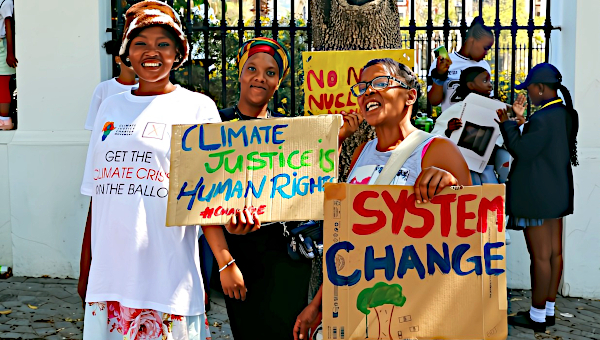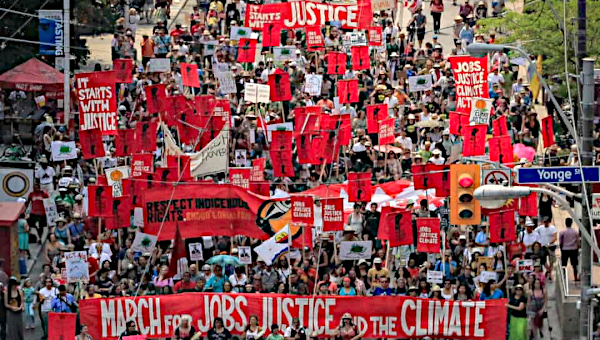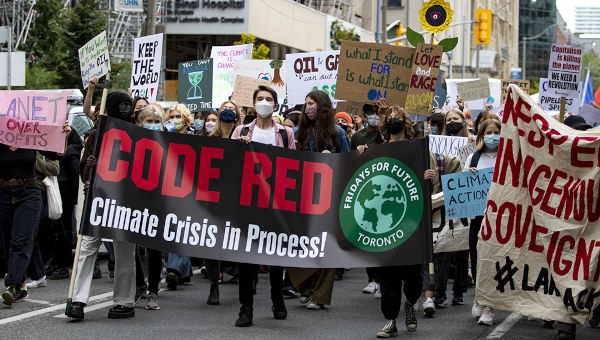The Climate Summit in Paris has once again reminded us of how vulnerable we are on planet earth. However, humanity is faced with a number of deep and challenging crises: economic, social, political, over food – and, of course, over climate change, which is threatening the very existence of millions of people. These crises have many of the same root causes, going to the core of our economic system.
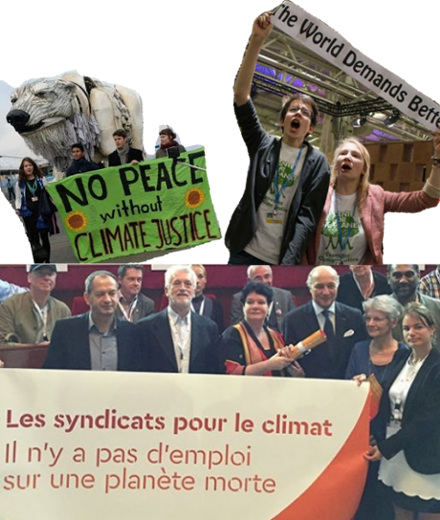 Strong vested interests are involved. It is thus an interest-based struggle we are facing. All over the world, people are organizing and fighting against the effects of the crises. Trade unions are heavily involved in many of these struggles, and so are many other movements – single-issue as well as broader social movements. Increasingly, our entire social model, the way we produce and consume, is under question. The way out of these crises requires a system change and this can only be achieved if we are able considerably to shift the balance of power in society. This leaves us with the challenge of unifying movements and continuing struggles – particularly to bring anti-austerity together with the struggle against climate change.
Strong vested interests are involved. It is thus an interest-based struggle we are facing. All over the world, people are organizing and fighting against the effects of the crises. Trade unions are heavily involved in many of these struggles, and so are many other movements – single-issue as well as broader social movements. Increasingly, our entire social model, the way we produce and consume, is under question. The way out of these crises requires a system change and this can only be achieved if we are able considerably to shift the balance of power in society. This leaves us with the challenge of unifying movements and continuing struggles – particularly to bring anti-austerity together with the struggle against climate change.
Agreement, But No Solution
At the recent Paris Summit (COP21), the first ever truly global agreement to fight the climate crisis was concluded. Governments have been negotiating for more than 20 years (more or less since the Rio Summit in 1992) in order to achieve that. During this period, however, greenhouse gas (GHG) emissions have not been cut. Quite the opposite. Emissions have increased immensely, by more than 60 per cent. Transport emissions have increased 120 per cent over the last 30 years, and they are still rising all over the world – even at a rate that outweighs cuts in other economic sectors.
The stated aim of the Paris agreement is ambitious. The target of keeping global warming below 2oC was strengthened, so that governments should now “pursue efforts” to limit the temperature increase to 1.5oC above pre-industrial levels. The weakness of the agreement is that there is a huge gap between this aim and the measures agreed upon to reach it. Based on the voluntary pledges (so-called Intended Nationally Determined Contributions – INDCs) from all countries on how much they are prepared to cut their emissions, we are so far on course for a temperature increase of 3-4oC. This means climate catastrophe.
A Question of Power relations
The catastrophe, though, can be avoided. It is both possible and realistic to cut GHG emissions sufficiently to avoid the worst effects of global warming. To believe that this will happen by itself, through the process of adjusted voluntary pledges every five years, is a very risky business. To assess that possibility, we should take a closer look at the COP process so far – and the lack of action to prevent global warming. We should ask ourselves: why have our governments during the last 20+ years been unable to agree on necessary measures – and even more so, been unable to do what science tells us is necessary to avoid climate catastrophe? It is not because of a lack of solutions. The climate crisis can be prevented. We do have the knowledge and technology we need. The main barriers are the social, political and economic power relations in society. Therefore, only massive pressure from below, from a broad coalition of trade unions, other social movements, environmentalists and others can save us from climate catastrophe.
An Interest-Based Struggle
We are talking about vested interests such as some of the most powerful corporations in the world – allied to an army of neoliberal politicians serving their interests. Seven of the ten biggest and most powerful companies in the world are oil companies. These firms are using all their power to avoid policies that hurt their economic interests. They execute enormous economic and political power. Where politicians are for sale, they buy them. Where governments or regimes challenge their power, they contribute to getting rid of them.
Workers all over the world fight against these interlocked crises – they fight for jobs, decent jobs, for living wages, for social protection, they fight against social degradation, they fight to improve their communities, for their livelihoods. Many of the policies used elsewhere to combat these crises are so-called austerity policies. But these are not, as some will have it, “necessary cuts in over-expanded public services” or “necessary downward adjustment to make workers’ wages competitive.” Austerity is a class-based policy – with the ultimate aim of increasing the return on investment. This represents the main frontline in the class war now coursing over the world.
Systemic Crises
The fight against climate change – against climate catastrophe – is not an extra struggle that the trade union movement must take on in addition to fighting austerity. It is, and will increasingly be, an important part of the same struggle. If climate change is not stopped, or limited to the 1.5 or 2oC target, which is within reach if we act rapidly and forcefully, it will actually become job-killer number one. It will destroy communities and it will lead to enormous social degradation. It will further redistribute wealth from the bottom to the top, hugely increasing poverty and causing emigration crises of unknown dimensions. Our struggle to avoid devastating climate change is therefore an important part of the interest-based struggle over what kind of society we want.
Both the economic crisis and the climate crisis are systemic. They are rooted in the same economic system. A system which is geared toward making profits rather than producing use values; dependent on economic growth (capitalism without growth is capitalism in crisis); a system exploiting workers and over-exploiting natural resources – one that is also about to destroy planet earth as a place to live for future generations.
Public Ownership and Democratic Control
To stop this, we need to act rapidly and forcefully. We are already just about to pass the point of no return regarding the 2oC threshold of global warming. During the more than 20 years of the COP process, we have seen that big oil, big finance, neoliberal governments and market forces have been unable to solve these problems on our behalf. The same goes for the economic and social crises. The corporations are mobilizing all their power to avoid any restrictions on their desperate hunt for more profit. More austerity and more GHG emissions are the inevitable results. The good intentions and goals of the Paris agreement give us a legitimate and powerful framework to enter this fight forcefully and make the system changes necessary to save us from catastrophes.
“Neither the trade union movement, nor the environmental movement, nor single-issue movements are able to win this struggle alone.”
One of our most important challenges is to bring the powerful corporations and institutions which benefit from the financial-industrial fossil fuel complex under democratic control. That requires the mobilization of enormous social and political power. Neither the trade union movement, nor the environmental movement, nor single-issue movements are able to win this struggle alone. We need, more than at any time before, to build broad alliances if we are to turn the tide.
Unify the Social with the Climate Change Struggle
The trade union movement will have to play a decisive role in this struggle, because of its strategic position in society. However, we have to be honest and admit that so far, the movement has not taken sufficient responsibility in fighting these crises. Unions are on the defensive all over the world. The trade union movement has developed ever more consistent policies against austerity and global warming over the last years. What is required now is a deeper discussion of effective strategies and what is required in terms of mobilization and forms of struggle to achieve our goals.
To bring strategic sectors of our economy into public ownership under democratic control will have to be a decisive part of the struggle ahead. In the fight against climate change, the energy sector stands at the forefront: CO2 emissions are all about energy, and without bringing that sector under democratic control, we will not achieve the deep transformations we need rapidly enough.
Growing Pressure from Below!
The anti-austerity struggle raises the need for public ownership and democratic control in a number of other areas – in defence of public utilities as well as in the fight to bring privatized property and services back under democratic control. The fight against climate change and the fight against austerity cannot be abstract; it has to address concrete problems and solutions in people’s daily lives. We need to unify and make the struggles broader. Most unions today are involved in anti-austerity fights. Ever more unions are joining the campaign against climate change. Initiatives like the Trade Unions for Energy Democracy (TUED) and the Global Climate Jobs Network represent important developments in this regard. What we need now is broad coalitions willing to fight, a more radical agenda, more militancy and thus a growing pressure from below to ensure that the aims and ambitions set out in the Paris agreement can be realised. •
This article was written on the basis of a contribution made at a seminar organized by the Rosa Luxemburg Foundation, New York Office, at the Peoples’ Climate Summit, Paris, 5 December 2015. It was first published on the Social Europe website.
Why the Kyoto Protocol Failed
Ulrich Brand
The Kyoto Protocol has strengthened those in power and the existing economic system. Climate change cannot be stopped with market mechanisms.
The Kyoto Protocol, just like the EU Emissions Trading Scheme, has been in force since 2005, and yet the use of fossil fuels, particularly coal, has since increased. Reasons for this include low coal, gas and oil prices – not least due to the ecologically problematic challenges of ‘unconventional’ energy sources such as tar sands or those obtained through fracking.
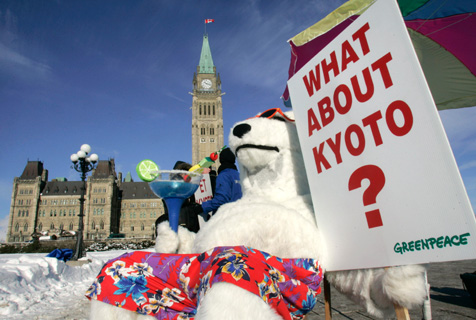 The idea that Emissions Trading and two other ‘flexible’ Kyoto Mechanisms – the “joint implementation” and “clean development mechanism” – would contribute to attaining climate protection goals was a misconception from the very beginning. During the Kyoto Protocol Negotiations, the EU advocated clear upper limits for emissions, but the USA and Japan prevailed. Incidentally, the main proponents of Emissions Trading were the oil companies BP and Shell.
The idea that Emissions Trading and two other ‘flexible’ Kyoto Mechanisms – the “joint implementation” and “clean development mechanism” – would contribute to attaining climate protection goals was a misconception from the very beginning. During the Kyoto Protocol Negotiations, the EU advocated clear upper limits for emissions, but the USA and Japan prevailed. Incidentally, the main proponents of Emissions Trading were the oil companies BP and Shell.
We shouldn’t forget: at the end of the tough negotiations on the 1997 Kyoto Protocol, Emissions Trading was considered to be an interim solution, which should be replaced by 2020. Now there seem to be no alternatives. This cannot remain the case.
The EU introduced a similar system at the same time. Because too many certificates were issued to businesses, Emissions Trading was not an incentive to invest in low CO2 or CO2-free technology. So the price for a tonne of carbon dioxide had to stay at 20 to 30 Euros. In mid-November 2015 it was just above 8 Euros.
It gets even worse: studies of the year 2012 show that the vast majority of trading using Emissions Certificates was done by financial investors, which are very profit-motivated in terms of trade. They make large profits on trade and re-sale, when there are large fluctuations. And they have no direct interest in a reduction of greenhouse gases. The system is based precisely upon the fact that there aren’t only relatively high prices, but also that they are stable, so that businesses can plan.
Modern Indulgence
With the two other Kyoto Protocol ‘flexible mechanisms’, polluters in industrial countries can buy themselves out of climate protection efforts by investing in other countries in the global North or South. Where developing countries are concerned it is, to put it bluntly, imperial, because projects are often carried out at the expense of the interests of the local population. As a result, opposition has developed in many places. Climate policy researcher Achim Brunnengräber speaks of “modern indulgence trade,” where rich and powerful businesses in the North continue to pollute, while often supporting projects elsewhere – often questionable ones.
The latest craze in international climate policy, “Intended Nationally Determined Contributions” (INDC, we will all know the term after the mid-December summit in Paris) is a new round of non-binding voluntary action. We can all see what ‘voluntary’ means with the current VW emissions scandal.
Politically, it must not always be about trading upper limits, but rather about bringing destructive production methods to an end. Therefore: Emissions Trading and the other ‘flexible mechanisms’ with their neoliberal logic codify the economic system based on fossil (and nuclear) fuels. Alternatives are blocked. So long as there are climate policy mechanisms that are flexible and ostensibly in line with the market, one thing is for certain: the power of mining companies, energy and industrial companies, and the governments that support them.
A fundamental regeneration of the energy industry and the economy should not be subjected to the interests of powerful actors in the marketplace. The real successes in energy policy and in tackling climate change such as the Renewable Energy Act have been implemented despite initial resistance from industry.
The imminent movement away from coal in Germany necessitates political debate. That is why the critical debates and local opposition to fracking initiatives or the construction of coal power plants are important. The “Ende-Gelände” (end of the road) movement in favour of moving away from coal is now competing with the legitimate legacy of the Anti-Nuclear Movement. And there are lots of initiatives that are already living with other models of prosperity: without automobiles, clothing made from animal skin, industrial agriculture, and others.
It is about the fundamental construction of production and ways of life, a socio-ecological transformation. The specific entry-point of left-wing politics is the idea that this should not rest upon the shoulders of the weak, but rather that sociological and economic issues should be conceptualized alongside issues of power and property.
Internationally, this means that medium-term alternatives should be offered to countries with economies based upon the extraction and sale of oil, gas, and coal. It is also about an ecological and united global economy. One of the central weakness of Germany’s Die Linke (the Left Party) is that they have not developed any wide-ranging and effective suggestions at present. •
Ulrich Brand is Chair of International Politics at the University of Vienna. His research interests are critical state and social theory, resource and environmental politics, and post-neoliberalism.
This article first published on the Rosa Luxemburg Foundation Brussels website.


